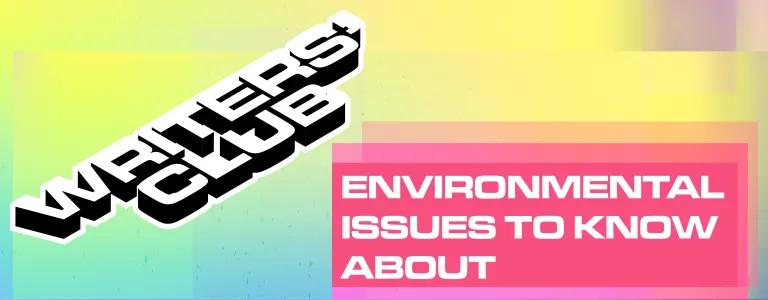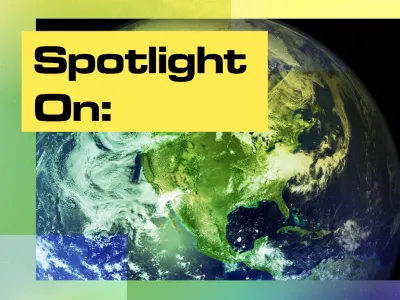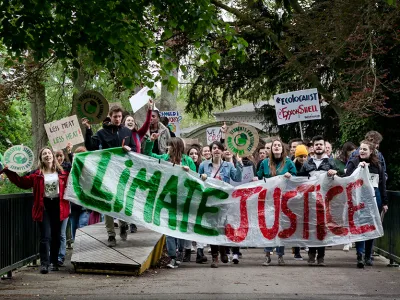
Writer's Club #3: Environmental Issues To Know About
Include this article in your Skills Builder Journal. It could help you develop.. 


A little while ago, we held a competition to create a new club of writers. Over the next few weeks, we’ll be introducing you to our winners, and the entries they submitted that got them their spot! This entry was submitted by Molly and is all about important environmental issues you should know about…
The past year has been one to remember for all the wrong reasons. Not only are we trying to navigate our way through a global pandemic, but the planet doesn’t seem to be doing too well either.
It can be easy to get completely overwhelmed with all of the information out there, not to mention how depressing it is, when all you are reading are headlines like ‘Not enough woodland’ to deal with climate change and UK woodlands at ‘crisis point’ amid wildlife decline. It can also be easy to not have the foggiest clue as to what the heck is going on.
In my opinion there are three main things to know about – climate change, plastic pollution and deforestation. I’m going to go through each one, and give some tips on small changes you can make to help.
CLIMATE CHANGE
What is the problem?
Climate change is probably the most well-known, controversial, and threatening problem to date. The actual term ‘climate change’ can be misleading, as the earth’s climate has constantly changed in the past (just think of the Ice Age films!). The problem today is that the climate is changing far too fast, and much of this is caused by human activities.
According to a NASA study, the world’s average temperature has increased by 0.8˚C since 1880. Although this doesn’t seem like a lot, it usually takes hundreds to thousands of years to change global temperatures. This rapid increase is mostly due to burning fossil fuels – in the past 20 years alone, fossil fuels have been responsible for almost three quarters of all human activity emissions.

Why should we care?
As global temperatures continue to rise, large amounts of sea ice and glaciers are melting. Between 1992 and 2017, 28 trillion tonnes of ice was lost, ultimately causing sea levels to rise. In the past 25 years, sea levels have risen by three inches, which increases the risk of flooding in coastal areas.
Seaside towns aren’t the only places that are at risk from flooding though. A briefing paper from Christian Aid showed that large cities that are already sinking are at the highest risk of flooding. Quite shockingly, London is top of the list, alongside Shanghai, Bangkok, Houston, Jakarta, Manila, Dhaka and Lagos.
What can we do?
Although it may seem trivial, walking and taking public transport where possible can have a huge impact, as can reducing the amount of red meat you eat. The WWF has a ‘carbon footprint calculator’, which you can use to work out what your average carbon emissions are. This can then act as a guide to see which areas you can improve on in your everyday life.
PLASTIC POLLUTION
What is the problem?
By 2050, the weight of plastic in the sea will outweigh the fish. This is pretty shocking – after all, the sea is pretty big and has rather a lot of fish in it – but when you look over the facts it does, unfortunately, make a lot of sense.
Over 300 million tonnes of plastic are produced annually, and 40% of this is used and thrown away within the same year (only 5% of plastic is actually recycled). Much of this plastic waste, or more precisely, 18 billion pounds worth, ends up in the ocean every year. There is actually so much plastic in the sea that there are five distinct collection zones, known as garbage patches. The largest of these is the Great Pacific Garbage Patch, which covers an area of 1.6 million km2 and contains 1.8 trillion plastic pieces.

Why should we care?
Plastic in the ocean is a danger to all marine life. Thirty percent of marine species that interact with plastic waste become entangled and strangled, and 50% of sea turtles and 90% of seabirds are estimated to have eaten plastic. A species of seabird called fulmars have been found to collectively carry six tonnes of plastic waste in their stomachs in the North Sea area alone. In the Kure Atoll and Oahu Island, 45% of the wet mass of Laysan albatross chicks is actually plastic.
But plastic in the ocean doesn’t just affect marine animals. As marine animals eat plastic, it stays in their system, meaning that we are then eating that plastic waste too, when we eat them. A single portion of mussels can contain up to 90 pieces of plastic, and by 2100 it is estimated that Europeans will be eating 750,000 pieces of plastic every year.
What can we do?
The best way to stop plastic pollution is to limit the amount of single-use plastic we use. Reuseable water bottles, fabric shopping bags, bamboo toothbrushes and plastic-free shampoos and conditioners are a few examples – Peace with the Wild is a fab website to check out some plastic-free products.
DEFORESTATION
What is the problem?
Deforestation has been happening for centuries. 80% Eighty percent of Western Europe was covered by forests 2000 years ago; today only 34% is left. The areas most threatened by deforestation are the tropical rainforests like the Amazon, where 17% of its forest has been destroyed in the past 50 years. The majority of these trees are chopped to make way for agricultural land and cattle ranching, but palm oil plantations have also become more frequent (remember Iceland’s banned Christmas advert?).

Why should we care?
Forests are home to 80% of all land animals and plants, who are all threatened with habitat loss and extinction from deforestation. Forests also help reduce the effect of climate change by acting as ‘carbon sinks’ – this means they contain more carbon than they release. As forests are chopped down, they release all this carbon as carbon dioxide (CO2) into the atmosphere, which acts as a greenhouse gas and increases the effects of climate change.
What can we do?
One way to help is by avoiding products that contain palm oil – shampoo is a big one. The Tree App is also a great app that lets you plant a tree a day at different locations around the world.
Want to know more about helping out our planet? Check out our Spotlight On Climate Change with Reboot The Future. And don’t forget to read our other winning Writers’ Club submissions so far - here’s Louahanna-Rane’s piece on making ancient war strategies work for your exam prep!




